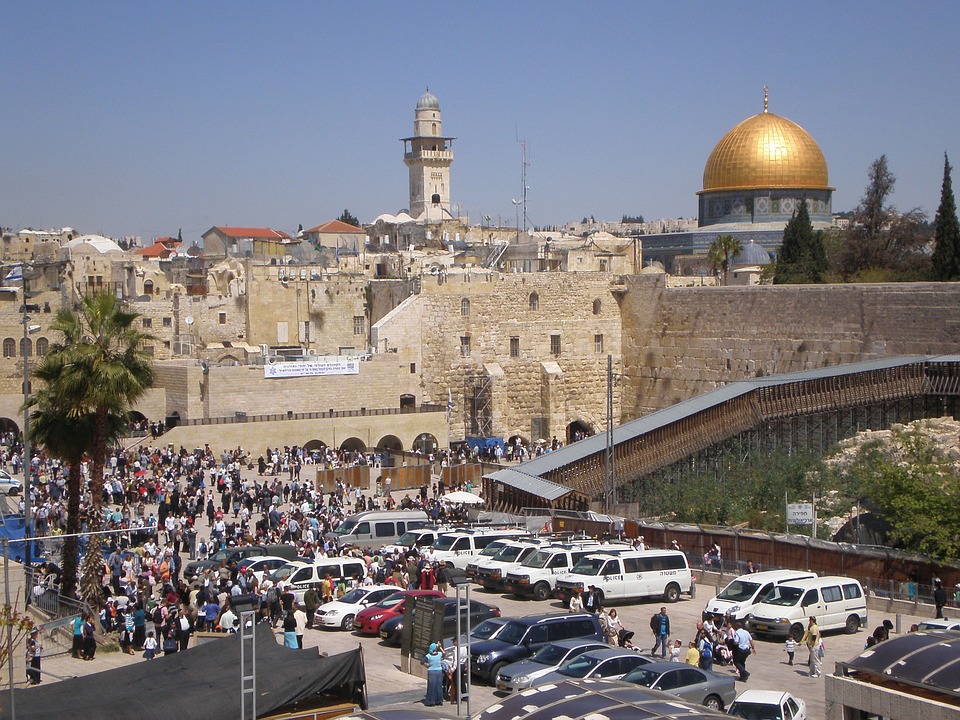Zionist Organization of America (ZOA) President Morton A. Klein released the following statement:
We’re shocked at Secretary of State Rex Tillerson’s remark to reporters during their Air Force One flight from Riyadh to Israel that they were heading to “Tel Aviv, home of Judaism,” and the Secretary’s evasive refusal to acknowledge that the Western Wall is in Israel. (See “Tillerson says Tel Aviv is ‘home of Judaism.’ It’s Not; JERUSALEM, ISRAEL’S CAPITAL, IS THE HOME OF JUDAISM,” by Jordan Schachtel, Conservative Review, May 22, 2017.)
In a sense, all of Israel is the home of Judaism. 92% of Tel Aviv’s population is Jewish. Jewish architects and artists built the modern city of Tel Aviv out of barren sand dunes. But Tel Aviv is best known as a major center of Israel’s high tech sector, and as a Jewish “city that never sleeps” party city – rather than as Judaism’s religious center. And the center of Judaism – the Jewish religion and heart and soul of the Jewish people – the place of our dreams and prayers and songs and the center of our history – is unquestionably Jerusalem.
According to the Tel Aviv-Yafo official website, the “Top 10 Places” in Tel Aviv-Yafo are: “Beaches; Old Jaffa; The Tel Aviv Port (“HaNamal”); The New Tel Aviv Museum of Art; The Rabin Memorial; Culture Square; The Carmel Market (“Shuk HaCarmel”); Nachlat Binyamin – The Artists Market; Neve Tzedek And The Tachana (Historic Train Station); Bauhaus Architecture.
Only one of these Top Ten Tel Aviv sites is mentioned in the Hebrew Bible – Jaffa/Yafo – as the port from which the prophet Jonah embarked on a ship before being swallowed by a fish. By contrast, Jerusalem is mentioned in Jewish holy books some 700 times.
The only other “top ten” Tel Aviv site with religious Jewish historical significance is the old Jaffa train station – and that’s because the Tel Aviv-Jaffa train station enabled travel to the center of Judaism -Jerusalem! The Tel Aviv-Jafo website explains: “Built in 1892, the station connected Jaffa Port and Jerusalem, enabling pilgrims a short (6 hour) journey to the Holy City [Jerusalem].”
The central “home of Judaism” is Jerusalem. Jerusalem is where Jewish kings reigned for hundreds of years. The City of David archaeological site – the place where King David established the Jewish kingdom – is known as the birthplace of Jerusalem.
Jerusalem is the site of the First and Second Jewish Temples – the holiest sites in Judaism – and the site of the remaining Western Wall – the wall that was closest to the Temple’s Holiest of Holies. Throughout 1,900 years of exile, Jews throughout the world braved life and limb to make pilgrimages to Jerusalem and live their lives in this holiest of Jewish cities. Both today and throughout the exile, Jews have always turned to the Temple Mount in Jerusalem to pray. The Talmud (Berachot 30a) says: “If someone is praying outside the Land of Israel, he should direct his heart in the direction of Israel. When praying within Israel, direct the heart toward Jerusalem. Those in Jerusalem should direct their hearts to the Temple,” and “All of the people of Israel find themselves focusing their hearts toward one place, the Holy of Holies in the Temple.”
And Jerusalem’s 3,000-year-old Mount of Olives Jewish Cemetery is the home and final resting place of tens of thousands of well-known Jewish rabbis and figures from throughout the millennia.
Jerusalem is (and has been) the site of countless synagogues – including the famous Hurva Synagogue and 58 centuries-old synagogues that the Arabs demolished during the 19-year period (1948-1967) when Jordan illegally occupied Jerusalem, after Jordan invaded Israel in 1948.
Every Jewish wedding remembers the destruction of the Jewish Temples in Jerusalem by breaking a glass under the foot of the groom.
Jews celebrate the ancient Persian King Cyrus for permitting exiled Jews to return to Jerusalem to rebuild the Temple (build the Second Temple).
Israel’s national anthem, HaTikva (The Hope), and the nine-stanza poem on which the anthem is based, Tikvatenu (Our Hope) describe the Jewish people’s 2,000 years of yearning for Jerusalem. The poem also describes the Jewish’s people’s mourning for the Jewish Temple in Jerusalem – and longing for “our precious Wall” – Jerusalem’s Western Wall.
Dozens of other songs also speak of the Jewish people’s attachment to Jerusalem. Perhaps the most famous are “Yerushalayim Shel Zahav” (“Jerusalem of Gold”) and “Im Eshkachech Yerushalayim” (“If I Forget Thee Jerusalem”). The latter is based on the heartfelt words of Psalm 137: “If If I forget you, Jerusalem, may my right hand forget its cunning. Let my tongue cleave to the roof of my mouth, if I remember thee not; if I set not Jerusalem above my chiefest joy.”
The Talmud (also in Berachot 30a) discusses the dilemma of a blind person who does not know which direction he is facing when he is praying, and concludes that such a preson is excused from facing Jerusalem, and can simply pray by focusing on G-d.
Only those who are blind cannot point to Jerusalem as the center of Judaism and Israel.
